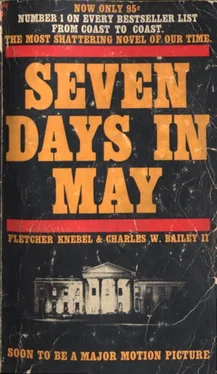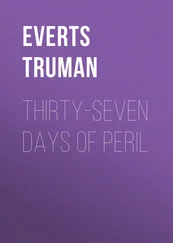FLETCHER KNEBEL & CHARLES W. BAILEY II
SEVEN DAYS IN MAY
... In the councils of government, we must guard against the acquisition of unwarranted influence, whether sought or unsought, by the military-industrial complex. The potential for the disastrous rise of misplaced power exists and will persist. We must never let the weight of this combination endanger our liberties or democratic processes.
President Dwight D. Eisenhower, January 17, 1961
The parking lot stretched away to the north, cheerless and vacant. Its monotonous acres of concrete were unbroken except where the occasional shadow of a maple tree speared thinly across the pavement. In the nearby lagoon that opened out into the Potomac, small craft lay in rows at their moorings as though glued to a mirror. No ripple disturbed the surface of the water where it reflected the early-morning sun that was now rising over the silent domes and roofs of Washington across the river.
Colonel Casey parked at the River entrance of the Pentagon. He stood beside his car for a moment, jingling his keys absently as he eyed the old Ford with disgust. Age had settled upon it. Its enamel, once a deep blue, was faded down to a kind of neutral smudge. A rear windowpane was cracked and the fenders were nicked and dented.
Turning away from his car, Casey looked at the great building. The Pentagon loomed up, opaque and formidable, rows of identical windows marching away around its corners without a single touch of grace or humor, as bleak and grim as the business that kept men busy inside it year after year.
Ordinarily Casey approached Sunday duty with a kind of sunny resignation. But this morning a vague uneasiness had ridden with him, an unwanted passenger as he drove to work.
He couldn't diagnose it. Certainly there were plenty of possible causes. The country at large was in a sullen mood-apprehensive over the treaty, wary of Moscow, angered by the prolonged missile strike, worried about unemployment and inflation, not quite sure of the man in the White House. An immediate irritant, in his own case, was the strike. Only Friday General Seager, the commander of the Vandenberg Missile Center, had warned in a biting, almost sarcastic message that if the strike did not end in a few days the entire Olympus program would be derailed for months.
Casey stepped briskly across the special parking area, trying to shake off his mood. As each foot swung forward, a glint of high polish intruded on the lower fringe of his vision. If a man learns nothing else in twenty years in the Marines, he thought, he learns how to shine shoes.
Colonel Martin J. Casey was director of the Joint Staff, the select group of two hundred officers that served as the research and planning agency for the Joint Chiefs of Staff. Once a month Casey took on the chore of Sunday duty officer, a post potentially as vital to the defense chain of command as it was boring to the temporary occupant.
He trotted up the broad steps to the River entrance and pulled open one of the tall wooden doors. The guard at the reception desk put down his newspaper to inspect Casey's pass.
"Tough luck, Colonel," he said. "Nice day for not working, isn't it?"
As Casey entered the Joint Staff area, with its big "restricted" sign, he passed through an electric-eye beam which triggered a two-tone chime to alert another guard. This one, a Navy chief petty officer, sat behind a logbook. Casey signed his name and wrote "0755" in the time-in column of the log.
"Morning, chief," he said. "Everything running smoothly?"
"Dead calm, sir." The guard grinned at him. "But I imagine the colonel would rather be out on the golf course today."
Casey could never quite get over the accuracy of the data which a good enlisted man acquired on the personal preferences of his officers. He winked at the sailor.
"So would you, chief. But someone's got to stand the watch."
"Right, sir." Then, taking a little Sunday-morning license, the guard added: "And probably more gets done, sir, without so many topside."
Casey followed a corridor through the jungle of cubicles and offices which was the cloister of the Joint Staff. Once manned by more than four hundred officers and headed by a lieutenant general, the Joint Staff had in recent years been halved in size and reduced to little more than a personal planning agency for the chairman of the Joint Chiefs. This morning the area was as bare as the parking lot. Casey could hear one typewriter; the halting rhythm of the keys told him it must be an officer trying to finish an overdue paper. Casey turned into the large office that went with his job as staff director. The washed-out pale green of the walls told him he was once again at work in the impersonal labyrinth of the Pentagon. With a sigh he hung up his jacket and sat down to look over the Sunday papers he had brought with him.
He skimmed the Washington Post, read two columnists, looked at the baseball scores, and then settled into the New York Times, starting with a line-byline reading of the weekly news summary.
There was trouble everywhere, from Malaya to Milwaukee. The Chinese Communists accused the West of nurturing "spies and saboteurs" in Singapore. A conference of midwestern industrialists denounced the newly ratified treaty. A citizens' committee demanded, in wires to every member of Congress, that striking missile workers be drafted.
But however sour the world's mood, Jiggs Casey had to admit that his own should be bright enough today. For one thing, he felt fit and rested. Beyond his physical well-being, Casey at the age of forty-four had developed a protective skepticism about the woes of the world. It had been going to hell in a handbasket since the year zero zero, as he frequently put it, and if it weren't, who'd need to hire a Marine? His country, which he tended to view with a sort of vexed affection, had managed to survive for almost two centuries and with luck it might sidestep any irreparable injury for the three additional decades which he figured were about the span of his personal concern. But this morning his customary tolerance for the shortcomings of his nation had somehow been strained, if not quite broken. Casey felt uneasy, and he didn't like it.
Colonel Martin J. Casey, USMC, himself seemed built for survivability, as Pentagon jargon would have it. He wasn't handsome, but women had once found him irresistible and still admitted to each other that he was appealing. Men had always liked him. He stood just a hair over six feet and weighed one-ninety now, after almost a year behind his desk. He was about ten pounds overweight by his reckoning, but there was no obvious fat anywhere. A crew cut still masked the beginning of a thinning-out on top. Quiet, green eyes and a short neck gave him a solid look that was mirrored in the photograph of his two sons on the back corner of his desk.
Casey wasn't a crusader and he wasn't brilliant. He had learned at Annapolis, long before the end of his plebe year, that neither was necessarily an attribute of successful military men. But he was a good Marine who had never once pushed the panic button. He hoped he'd make brigadier general before he retired. If you asked him for more, he'd say: That's Casey, period.
It took him nearly an hour to read through the Times, and he made it without interruption. Not that he had expected any. On his once-a-month trick as Sunday duty officer and theoretical alarm bell for the chiefs in case of war, natural disaster, or telephone calls from the President or congressmen, nothing ever happened. The White House had called once, but on a matter so minor that Casey had forgotten its nature. As for the more frequent Congressional calls, it was a matter of working up the proper tone of sympathy, interest and alertness while jotting down the gist of the complaint for someone else's attention on Monday morning.
Читать дальше












